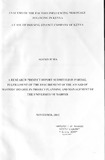| dc.description.abstract | The main objective of the study was to investigate the factors inf1uencing mortgage uptake Kenya. The study was guided by the following specific objectives; to examine the extent to which interest rate inf1uence mortgage financing in Kenya, establish the extent to which housing policies and procedure influence mortgage financing in Kenya, to determine the extent to which political environment inf1uence mortgage financing in Kenya, to determine the extent to which environmental risks inf1uence mortgage financing in Kenya.
A descriptive survey was employed in this study. It helped to describe the status of events and also helped to collect data over large areas. This study targeted 238 staffs in selected department in Housing finance Corporation, Kenya. Stratified random sampling method was conducted to capture the various levels of staffs and management. The data analysis method used was based on quantitative approach using descriptive statistics. Descriptive statistics such as means, standard deviation and frequency distribution were used to analyze the data.
Data was coded and entered into the Statistical Package for Social Sciences (SPSS), Version 17, for analysis. SPSS was used to perform the analysis as it aided in organizing and summarizing the data by the use of descriptive statistics such as tables. In addition, data was analysed through inferential analysis where by correlation analysis was conducted using Pearson correlation for parametric data and spearman moment correlation was used for non-parametric data. The study also established that enhancing secure and transparent titled lands, so as to minimise the risk of mortgage lending can ensure growth in mortgage financing.
The study established that respondents indicated that laws and institutions that are created to stimulate financial development and centralized/powerful governments which are incompatible with financial development affect mortgage financing in Kenya. The study revealed that laws and institutions that are created to stimulate financial development and centralized/powerful governments which are incompatible with financial development affect mortgage financing in Kenya.
The study concluded that interest rate setting on mortgage debt; government instruments and fiscal measures are the major policies that govern mortgage financing. The study concluded that policies in mortgage financing facilitate smooth completion of property transactions and foreclosures. The study recommended that further study should be carried out incorporating the entire industry at the functional level and set within the context of the overall corporate strategy. | en_US |

